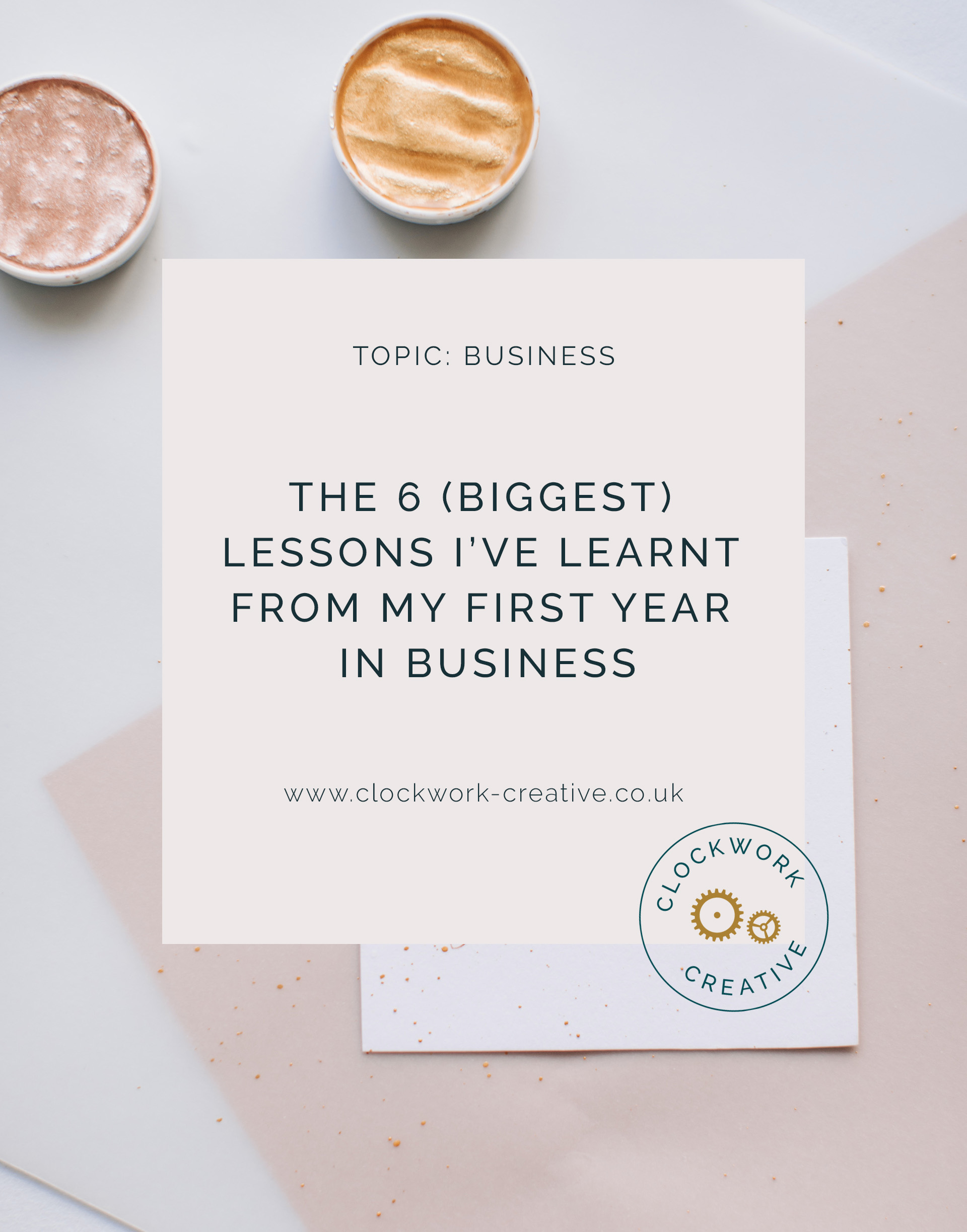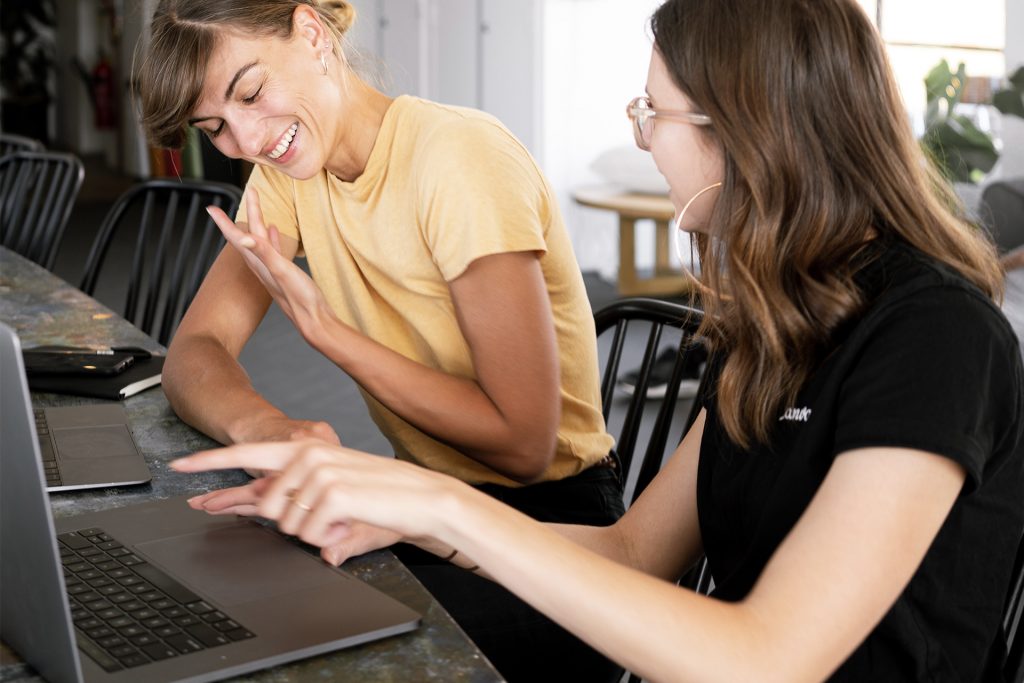I meant to do this post exactly a year after I launched Clockwork Creative but I’ll be honest, things have been a bit manic and I’m a few months late! However it means I’ve had 15 months of experience to draw upon to write this blog, and reflecting on the lessons I’ve learnt fits nicely with the upcoming New Year.
I have learnt SO much in my first year (and a bit) of running Clockwork Creative Consultancy. I’ve learnt things about myself, about my expectations and business. I’ve made progress and achieved goals but I have also had to rethink and change direction, and had my fair share of disappointment (not helped by the events of 2020!) and a few highs. It’s been a rollercoaster but I’d love to share it with you in hope the lessons below help any new businesses and freelancers out there.

LESSON 1 - SURROUND YOURSELF BY LIKE-MINDED PEOPLE
Whether it be like-minded clients, businesses to work with, people to partner with or entrepreneurs and business owners to connect with; surrounding yourself with like-minded people can help both your business and you as a person, your mindset, and growth and development. Sharing the same values, being able to create fruitful conversations and generate a positive connection is a great way to form professional relationships.
Clients you genuinely connect with will appreciate the value you add and not just the service you sell, communication is more effective and, in my experience, you are better placed to create the right solution for them/their business.
When it comes to partners or businesses to work with, it’s important to share the same values, the same high levels of drive and ambition, and the same attitudes. By selecting the right people to work with, it can help you refine your ideas as well as generate new ones, helps you to deliver on your brand promises and increases your chances of success.
I’ve also found creating a professional network or ‘tribe’ as some people now call it, is important and although I wouldn’t say I’ve found my tribe just yet, I am getting there. The people around you should inspire you, challenge you, motivate you, and be there for you when you really need them. A lot of networking events have been cancelled due to the pandemic, and therefore opportunities to meet other entrepreneurs is limited, but don’t let this stand in your way, look for online communities and virtual networking events. Thanks to a facebook group for local Hertfordshire freelancers, I was lucky enough to connect with some other freelancers and business owners during lockdown and I’m really looking forward to having in-person coffee and co-working sessions with them soon. You’ll know when you find these people, because you’ll want to run ideas by them, share your successes and failures with them, brainstorm ideas, and look forward to spending time with them.

LESSON 2 - KNOW YOUR VALUE
It may be tempting when trying to build a portfolio and client base to give big discounts or take on clients that you know aren’t right for you. But it’s crucial you know your value, as if you don’t value yourself, neither will your clients.
First step, above all else, believe in yourself. You know your stuff, you can achieve results, you are passionate about what you’re doing, you have goals and you can do something special. Then understand your value by reflecting on your knowledge, your expertise, your training, rate yourself fairly and decide on a price point and stick to it.
Working with the right clients also matters. Whatever your service or product there will always be those who charge less and those who charge more. Decide to only work with clients who really appreciate your offering and the value you add and are willing to pay for it. This means that you must be willing to turn potential clients down who do not fit into this category – see next lesson!
LESSON 3 - DON’T BE SCARED TO SAY NO AND TURN DOWN WORK
One of the hardest lessons I have had to learn was saying no to clients, even if this meant professionally and politely turning down the work. I’m lucky enough to say 95% of my clients have been brilliant and most of them are an absolute pleasure to work with, but you’ll always get difficult clients.
Often we feel as though we need to just put up with difficult clients because they are part of running a business. After all, the customer is always right and does it matter if they (eventually!) pay you?
Absolutely yes! Bad clients can end up costing you money. If they cause project delays, consistently pay late or haggle over fees, they can easily interrupt your cash flow. If they are constantly requesting changes or expect to exceed the project scope at no extra cost, they eat into the time you have to spend on other clients, or time that could be spent on growing your business. These difficult behaviours also make it tiring and hard to work with them, and they create additional and unnecessary stress for you and your team.
I’m now also finding myself becoming more adept at recognising difficult clients early on and it’s important you listen to your gut on this one (as difficult as that might be when there is the opportunity to earn money!). During the on-boarding process it’s likely you’ll get a feeling that they won’t be a good fit for you and spot signs that they either don’t share your values, don’t see your worth or they are already making constant changes to the project scope or timelines.
Should a potential client or client become a bigger hassle than the income is worth to you, then don’t be afraid to professionally turn down the work or recognise when it’s time to end a relationship with an existing client.
LESSON 4 - PROTECT YOURSELF
A contract or terms of business is still perfectly acceptable in the digital world, and as I’ve found, it is essential. Clients who are unwilling to sign a contract/statement of work/terms of business/business agreement (whatever you wish to call it), should be avoided.
You may feel confident you know the basics of solid freelancing agreements or project documentation, but for anything to be valid and deemed a contract, it requires a signature. A digital signature is easily obtained on documents and they are legally binding. Secure the necessary signatures on every contract before you begin work – this will also encourage the client to read the documentation thoroughly!
Another way to protect yourself is not being afraid to demand and wait for a deposit before scheduling and confirming a start date of any work. I’ll admit I have made this mistake a few times in the last year. I have scheduled work with a client and even turned down other work based on being at full capacity, then when the project is due to commence the client doesn’t pay the initial invoice, they delay or put the project on hold, or even ghost you. This can then leave you without any income and causes cash flow issues as you’re left with a gap in your schedule you may not be able to fill.
Worthy clients will expect to pay a deposit. My payment terms for new clients is half the total amount for the project in advance. After establishing a relationship with a client and for regular clients, you may work out other arrangements but I only do this once I have built a relationship based on trust.

LESSON 5 - THE JOURNEY TO SUCCESS ISN'T A STRAIGHT LINE
You start out full of hope and optimism and you have a large number of expectations. You’ve done extensive research, you know your audience and market, you do your marketing plan, you make projections in your business plan and away you go. Unfortunately, as 2020 has shown us, no matter how prepared you are you never know what is around the corner! You don’t know what may come along and derail plans, the market could be impacted, consumer behaviour can change, or you simply realise you need to take a step back, have a think and make some changes.
None of these things equal failure. The journey to success is up, down, wiggly, diagonal, backwards, and forwards, it’s not a straight line directly to your destination. There is absolutely nothing wrong with having to replan, make changes, diversify, change direction slightly or a lot – the point is you’re learning and everything we learn helps us on that journey to success. You must absolutely not beat yourself up about it, and while having expectations and setting goals is great, you have to be flexible and open to change.
This leads neatly on to my next lesson learnt about accepting and planning for change.
LESSON 6 - ACCEPT AND PLAN FOR CHANGE
I’ll be honest, once I did my business plan document when starting my business, I hadn’t planned to revisit it. I didn’t expect it to change, I didn’t expect my views or business to have to adapt or change, and sadly I got a bit of a shock. I got a great bit of advice from the wonderful Sophie, a startup business adviser (check her out Start up with Sophie), that your business plan should be a living breathing document and should evolve with your business. The mistake I made was I hadn’t expected needing to change some things so soon after launching my business, I hadn’t planned on making changes and I saw this as a bad thing and even as a bit of a failure.
Then I realised that I wasn’t a failure at all, it was my expectations and mindset that were wrong and made me feel this way. If I had just expected that I might need to evolve my business plan, my proposition and offering, and/or adjust certain things about my business, I would have accepted making changes with open arms without feeling like I’d failed.
Considering my training in agile digital development, I realised that I should have taken a far more agile approach and mindset in my first year of business. I should have planned for early validation, making sure I got as much feedback and tested as much as possible earlier, expecting to not necessarily get it right first time. I then would have easily been able to ‘pivot’ to ensure I invested my time and energy and money in the right places.
I also should have planned for change and harnessed it. By always being open to making changes no matter where you are in the delivery process, you can respond quickly and you can even use this to your competitive advantage. Then make sure you listen, reflect and respond. By listening to what customers are saying in reviews or feedback from clients, or by looking at your data and analytics, you can then reflect on what this is telling you and decide on how you want to validate the feedback and how you might want to take it on board.
Sadly the figures show a lot of new businesses and freelancers don’t make it through their first few years. And depending on the situation, that might be the right thing to do but don’t quit too soon! Don’t be afraid to reach out if you’re struggling, find a mentor or your tribe, ask questions, get advice, start over or change direction. Don’t be afraid to do whatever is necessary to find the right path for you and your business.
After one year (and a bit!) of full-time freelancing, these are the lessons I sadly learnt the hard way and I’m sure I still have a lot to learn. I really hope that by sharing these you can learn from my mistakes and avoid them altogether.
Please do drop me a line if you’ve found this post useful, email me on hello@clockwork-creative.co.uk.
Debs x





